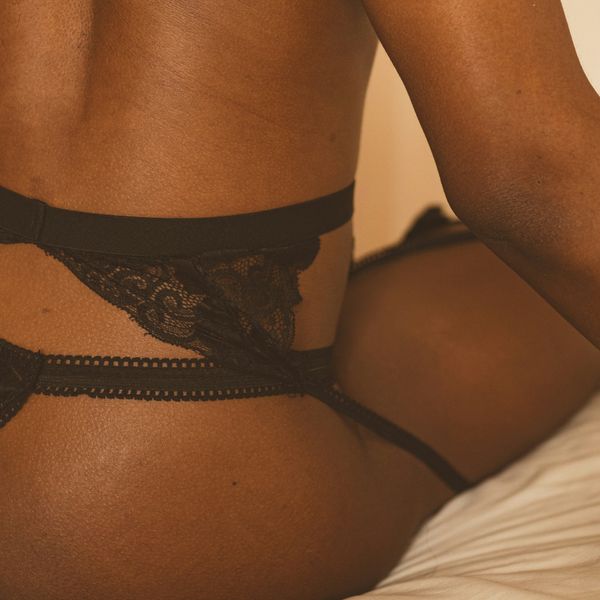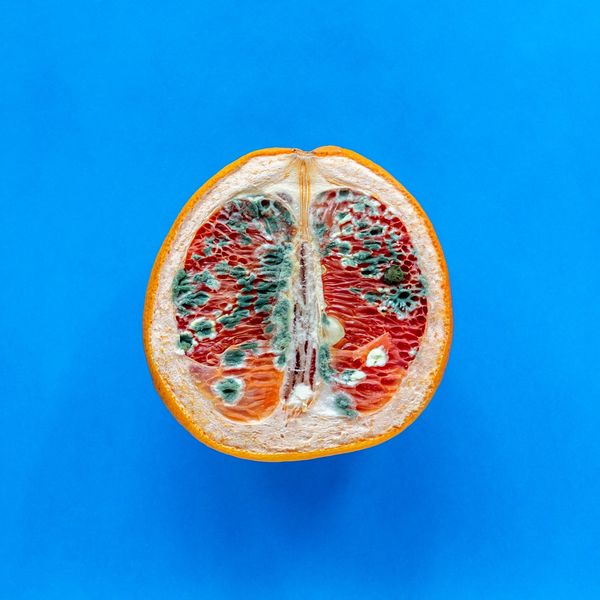Struggling With Vaginal Hyperpigmentation? There Are All-Natural Remedies For That.

Recently, while getting my monthly waxing down below, my waxer was commenting on how healthy my vagina — well, technically it’s my vulva — looks for my age. Lawd, where has the time gone when I’m finally at the point and place where “for my age” is following more and more comments? LOL. Anyway, when I asked her to expound, she went on to say that as women get older, it’s not uncommon to notice more sagging (check out “Vaginas Age Just Like Everything Else. You Can Slow It Down, Though.” and “Keep Your Vagina Like A (Literal) Fountain Of Youth”) and some discoloration as well.
As I was on my back, legs open and looking up at the ceiling, waiting for her to finish, I first thanked her for the compliment. Then I let her know that, indirectly, she was gonna help me with my next writing check from this platform — because what she said about vaginal discoloration was going to inspire me to do some additional research. And I did.
That said, whether you glance at your vagina on a daily basis, you only do it while you’re in the process of doing a vaginal self-exam (which is always wise), or you’re someone who doesn’t give how your va-jay-jay looks much thought unless you’ve scheduled a professional maintenance appointment or you’re “prepping” for a really hot night (check out “12 Men Told Me What They Love So Much About Vaginas”) — although this is a topic that you may not have considered before, I think you might find a few of these tips to be quite beneficial. That is, if you want to keep your vagina — well, vulva — looking radiant and youthful for as long as you possibly can, anyway.
Check it out.
Vaginal Hyperpigmentation. What’s the Cause?

Getty Images
Hyperpigmentation. When it comes to your vulva (the outer part of your vagina), whether you couldn’t care less about it or having some low-key irks you to no end, the first thing that you should know is that it’s pretty normal. Although it somewhat varies from person to person, it is important to always keep in mind that there are certain factors that can play a role in just how dark parts of your skin — again, in this case, your vulva — can get.
Factors like what? Well, for starters, your skin contains cells that are known as melanocytes; they are somewhat sensitive to your body’s natural hormones.
So, as your hormones shift (like during puberty, pregnancy, and the later stages of perimenopause), that can cause your skin to get darker when it comes to your vulva, nipples, and even your anus. Something else that can cause hyperpigmentation is constant friction (which is just one more reason to keep wearing super tight pants down to a minimum).
This is because friction can cause bodily inflammation (I just read that rosemary is the best herb for treating inflammation, by the way), and that can lead to discoloration. It should also go on record that sometimes skin experiences hyperpigmentation wherever “folds” in the skin happen (like your underarms or if your vaginal lips are “meaty”). Oh, and if you shave and get ingrown hairs or pimples, that can be a part of the culprit as well.
Are these the only things that can make vaginal hyperpigmentation happen? No. In fact, if your skin down there is super itchy or irritated (and you know that it’s not due to something like BV or a yeast infection), you should get your doctor to check it out. It could be because of an underlying condition like (possibly) diabetes, an STI/STD, or even PCOS (polycystic ovary syndrome).
However, the other causes that I mentioned tend to be the ones that are the most common. And for those, I have 10 all-natural things that you can do at home to 1) help to prevent vaginal hyperpigmentation from transpiring and/or 2) help to even out your vulva’s skin tone if some discoloration has already taken place.
10 All-Natural Things You Can Do At Home To Prevent Vaginal Hyperpigmentation
1. Make Sure Your Panties Are “Breathable”
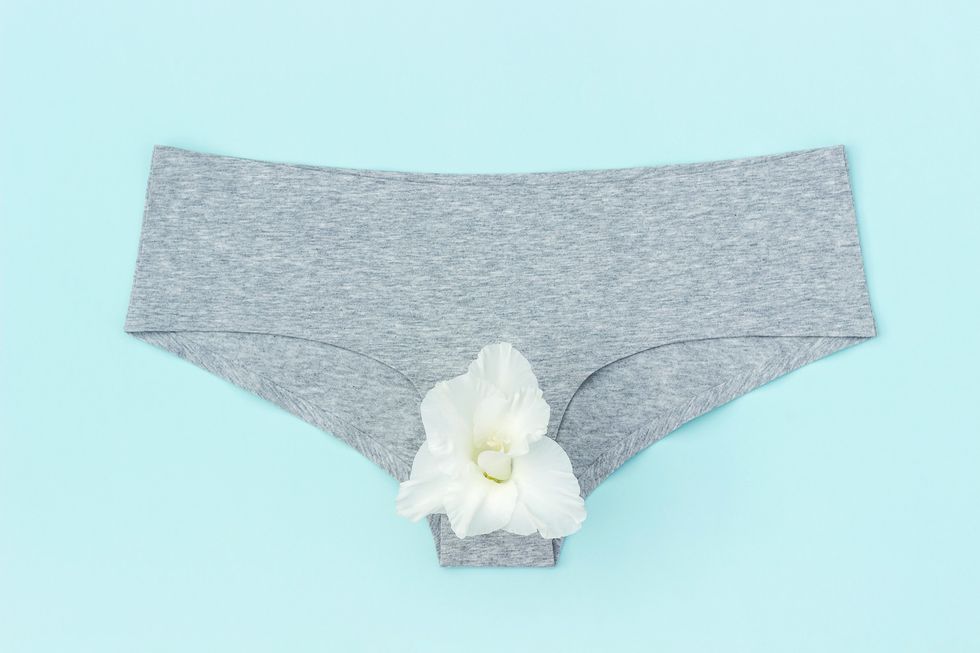
Getty Images
Okay, so for those of you who don’t wear any drawers (check out “10 Women Told Me Why They Stopped Wearing Panties (And They Don't Regret It)”), this first tip won’t apply. For the rest of us, though, just like tight jeans (for instance) can cause friction in your vaginal region, so can panties that won’t let your vagina breathe (whether it’s due to sizing or fabrics like spandex or nylon).
The method to the madness here is air carries oxygen and oxygen helps to give your skin the nutrients that it needs to remain healthy. Plus, looser underwear that’s made out of a breathable fabric also prevents chafing that could cause discoloration too. Now that you know this, if you’re not sure if you’re currently wearing the type of undies that are best for your vagina and vulva, I’ve got you covered (no pun intended). Check out “These Are The Kinds Of Panties Your Vagina Actually Prefers”.
2. Exfoliate Your Pubic Mound
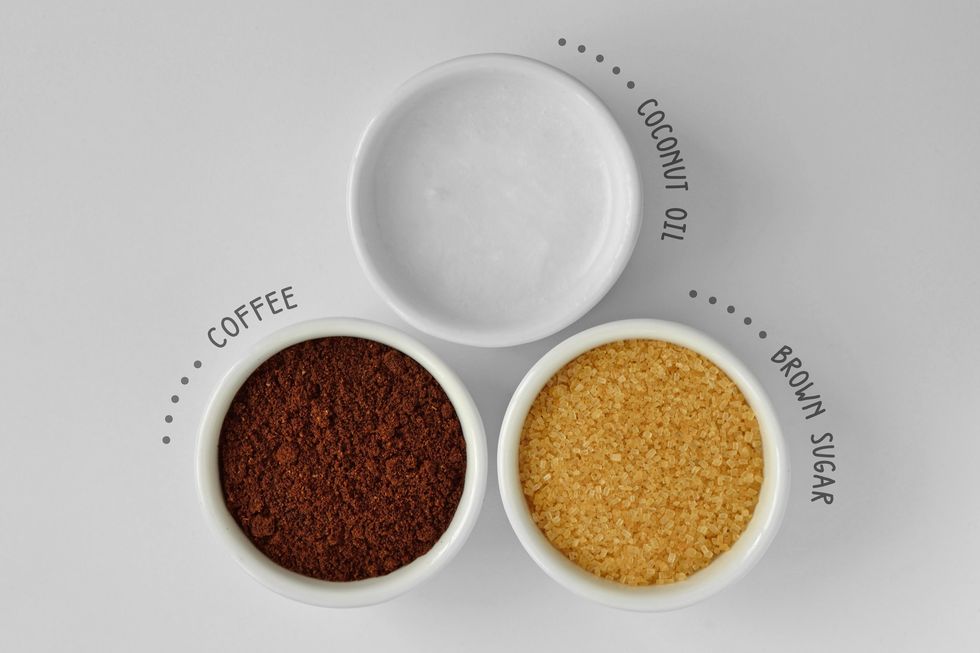
Getty Images
You know how I mentioned my waxer in the intro? Sometimes, she has some pretty wild stories about what happens when she gives someone a Brazilian wax for the first time (yeah, y’all can keep that). Since she said that it can take a good 4-6 months for 1) it not to hurt as much as it initially does and 2) for a person’s skin to fully recover, something that she recommends doing (2-3 days following your hair removal appointment) is exfoliating your pubic mound (the fatty area that covers your pelvic region).
Exfoliation helps to remove dead skin cells and turn over new skin, which can ultimately help to even out discoloration on your pubic mound (if you happen to have any).
Since that part of your body is more sensitive than others, my two cents would be to DIY an exfoliant out of some brown sugar (recipe here) or coffee grinds (recipe here). Natural ingredients reduce the chance of (further) irritating your skin.
3. Massage Your Vulva with Some Vitamin E Oil
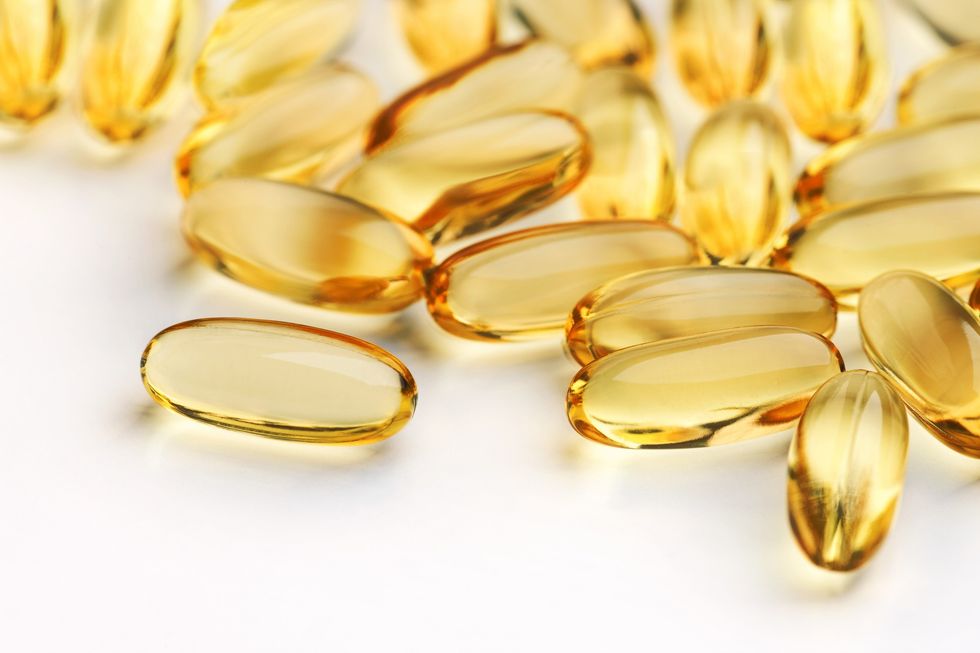
Getty Images
If you want your skin to look fresh and radiant on any part of your body, you’ve absolutely got to invest in some vitamin E oil. The properties in it help to deeply moisturize your skin, relieve any itching that may be associated with mild infections, allergic reactions to fabrics, or basic-level irritation; help to treat and heal eczema and psoriasis; minimize the appearance of scars over time, and it also can slow down your skin’s aging process — including when it comes to your vulva.
Also, since both vitamin E and ginseng have been proven to boost sexual performance in women (which ultimately leads to more natural lubrication), you can’t miss by applying some of this to your vulva just as soon as you possibly can.
4. Apply Geranium Essential Oil
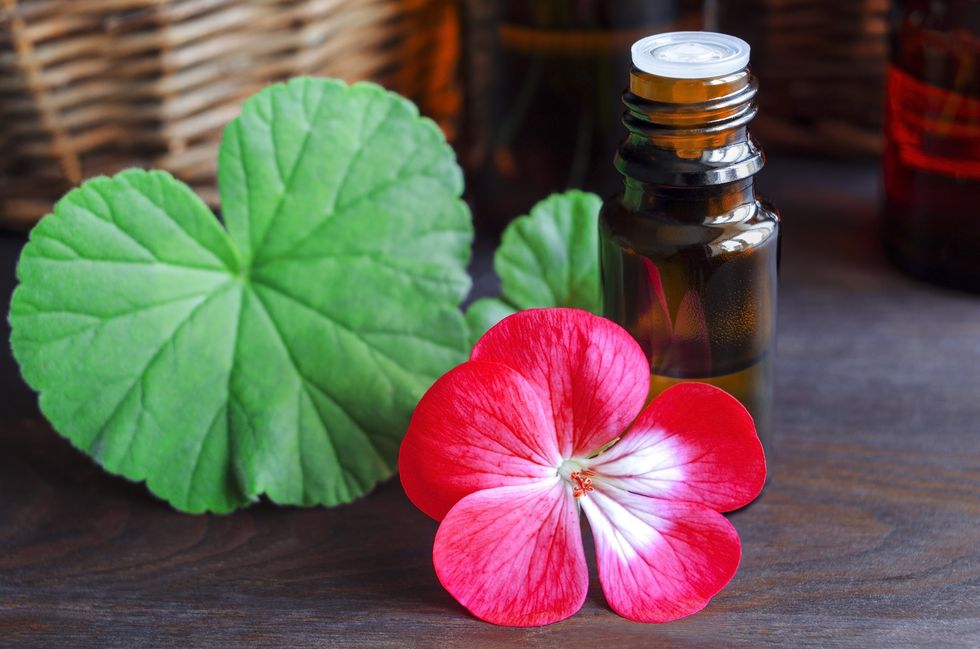
Getty Images
As I learn more about the purpose and power of essential oils, I wish I had started studying more than the “common” ones much sooner than I did. Take geranium oil, for example. Did you know that it has the ability to soothe sore muscles, speed up the healing process of certain respiratory infections, reduce anxiety and depression-related symptoms, fight candida, and even decrease nerve pain that comes from things like shingles (pretty impressive, right?)
However, the reason why geranium oil is listed here is because it’s also awesome (and non-irritating) when it comes to skincare. What makes it so divine? It reduces wrinkles, contains antibacterial and soothing anti-inflammatory properties, and naturally deodorizes, too.
Also, since this oil also provides a hormone-balancing effect for women who are perimenopausal and menopausal, when it comes to adding to your own essential oil collection, how could you not want some geranium oil now?
5. Or Frankincense Essential Oil
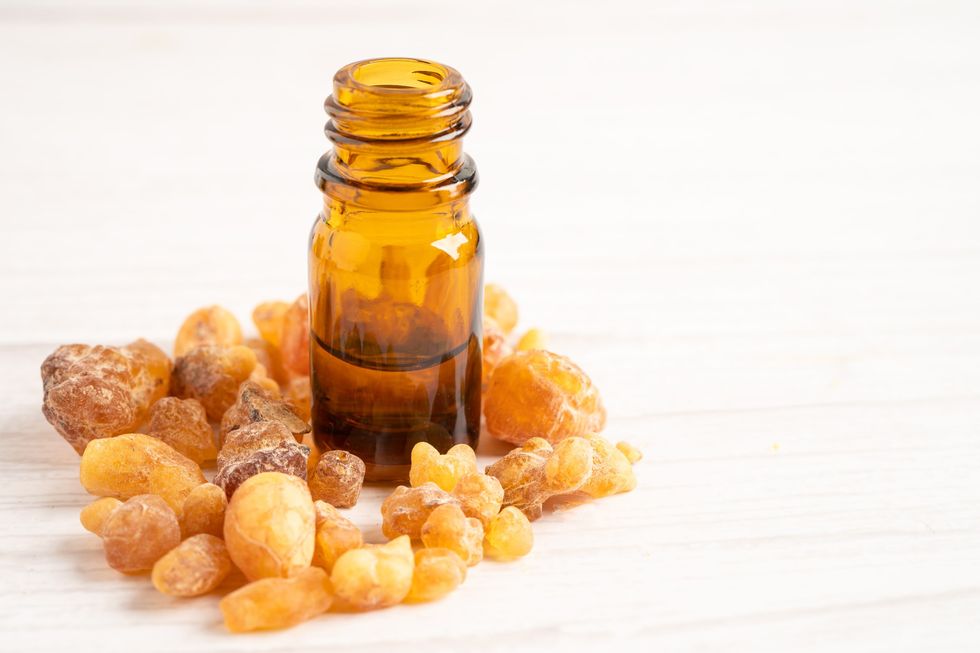
Getty Images
Personally, if frankincense oil had no real benefits, I’d still use it because I like how it smells. Kind of like woody-meets-musky-meets-sweet-meets feminine. The fact that it’s got some solid antioxidant, anti-inflammatory, and anti-aging properties in it makes it that much better. For instance, since it’s a stress-reducer, that’s always good to know if you’re doing your best to find holistic ways to keep your hormones as balanced as possible (because stress can put your hormones into influx). Some other notable things about this oil (as far as your vulva goes) are it fights off bacteria, helps to slow down aging signs, and actually balances hormones (and helps to improve fertility), too.
6. Soothe and Heal with Pure Aloe Vera Gel
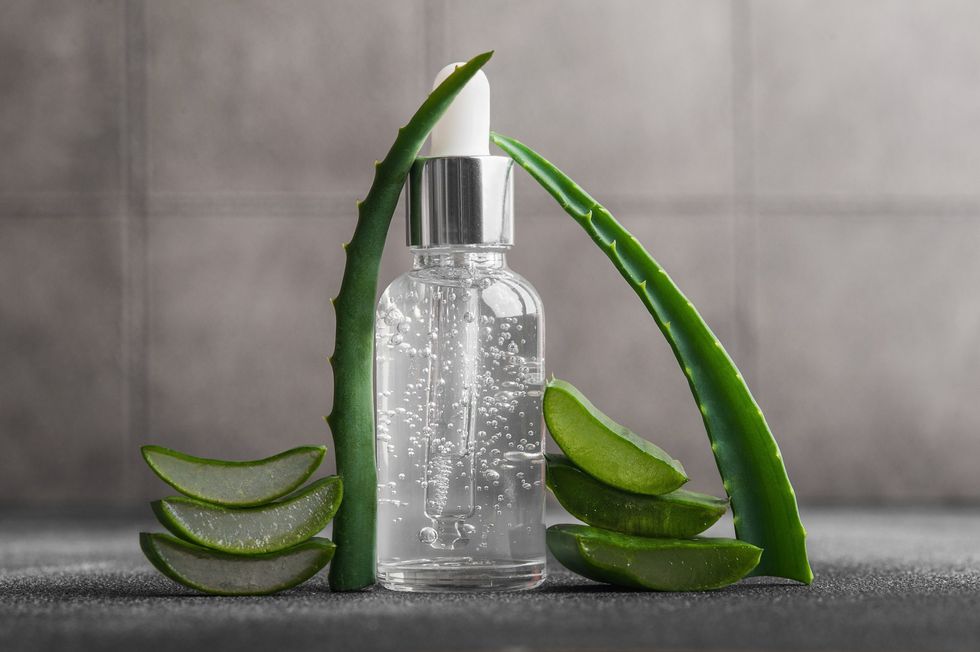
Getty Images
So, what if you recently took a look at your vulva and noticed that there is some discoloration due to things like nicking yourself while shaving or your skin getting over a couple of back-to-back yeast infections? One thing that you might want to try is applying some (and this is key) 100 percent pure aloe vera gel to the darker spots. For one thing, its high water content will help moisturize your skin.
Next, its anti-inflammatory, antibacterial, antiviral, and antiseptic will do wonders when it comes to helping to heal your skin. Another perk of the gel is it’s actually a natural source of salicylic acid, which means that it can help prevent future breakouts (if you happen to get pimples and acne scars down there). Plus, it also fades discoloration (over time) and slows down the aging process of your skin.
7. Take Vitamin C and D Supplements
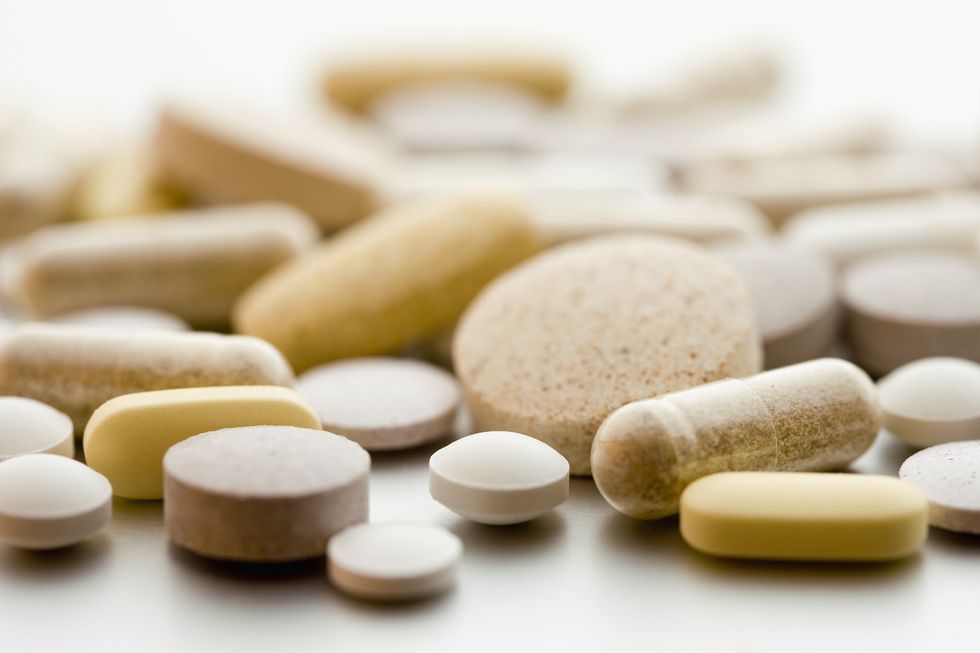
Getty Images
Did you know that almost every American in this country is not getting all of the nutrients that they need from their diet alone? Yeah, don’t get me started on what people’s health would look like if the United States actually covered healthcare costs (eye roll). ANYWAY, I’m just saying this to say that if you don’t already take a multivitamin, now is as good a time as ever to start. Or, if you’d prefer to take certain supplements that are specific to this article, vitamins C and D are your better bet.
Vitamin C is bomb because it’s great for skin health overall; it boosts collagen levels, helps to prevent infections, and speeds up the process of wound healing. Vitamin D is great because it helps to maintain your vagina’s pH levels, reduces the chances of vaginal infections, and if you happen to be on the other side of menopause, it can help with your libido and make arousal easier — and since vitamin D deficiency is so common among us (Black women) that is certainly something to especially keep in mind.
8. Use Lubrication During Sex
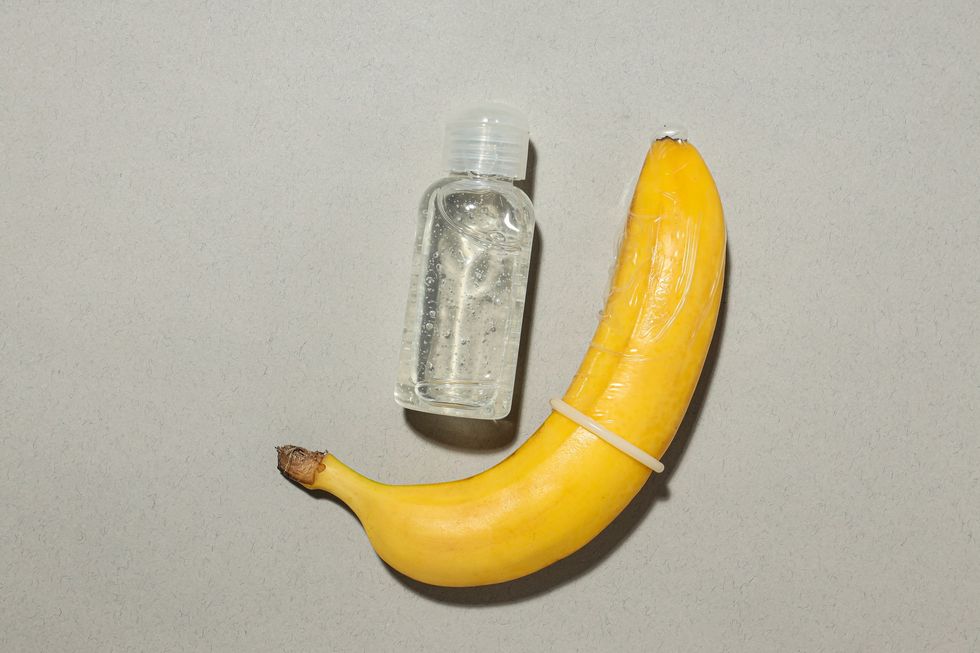
Getty Images
The main reasons why your body naturally lubricates your vagina during sexual activity are so that 1) penetration will not be painful and 2) there won’t be a ton of unnecessary friction during sexual acts. Yep, and there goes that word again: friction. Whether you struggle with getting as wet as you’d like due to hormonal reasons (or foreplay challenges; check out “What If The Sex Is Good...But The Foreplay Isn't?”) or you’re simply someone who takes the saying “the wetter, the better” quite literally (check out “The Wetter, The Better: 10 Creative Ways To Use Lubricant”), just remember that when it comes to preventing vaginal hyperpigmentation, all forms of lubricant will always be your friend.
9. Try Some Rose Bush Butter
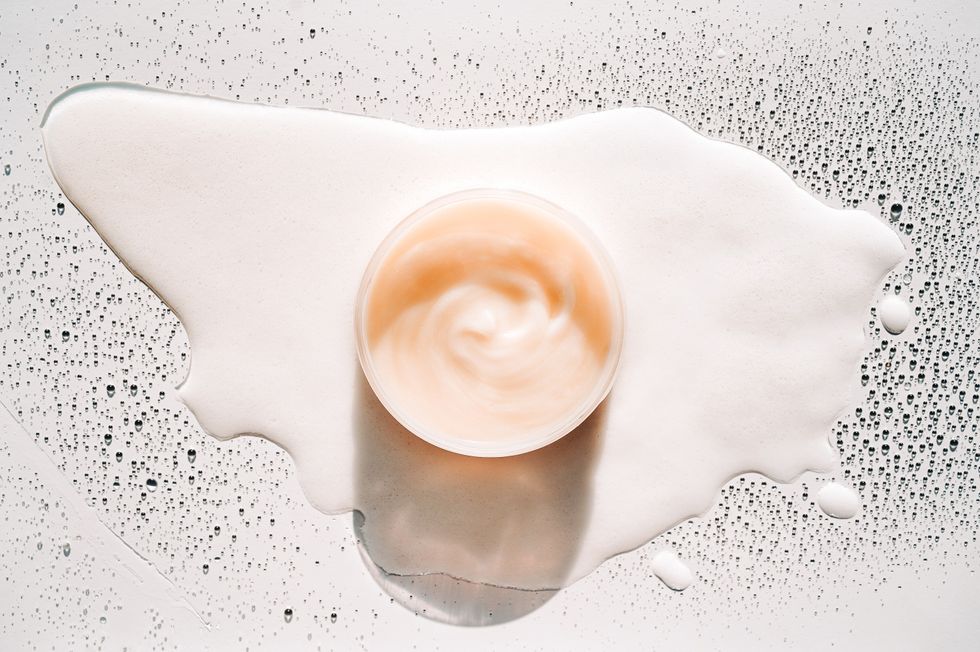
Getty Images
It really is amazing, the random things that you can find out on the World Wide Web. Take a product called Rose Bush, P-ssy Butter. I first stumbled upon it while reading an article about it on Well + Good’s website. The reason why it sings the butter’s praises is that it can do so many things for your vaginal region, from moisturizing and preventing chafing to making it smell great and serving as an all-natural lubrication (if you’re someone who DOESN’T use condoms).
Word on the street is that it can even help to keep your vagina’s pH where it’s supposed to be (which is always a bonus!). So, if you’re looking for something that can help, and heal your vulva, why not give some rose bush butter a shot? You can cop yourself some of it here.
10. Sleep Naked
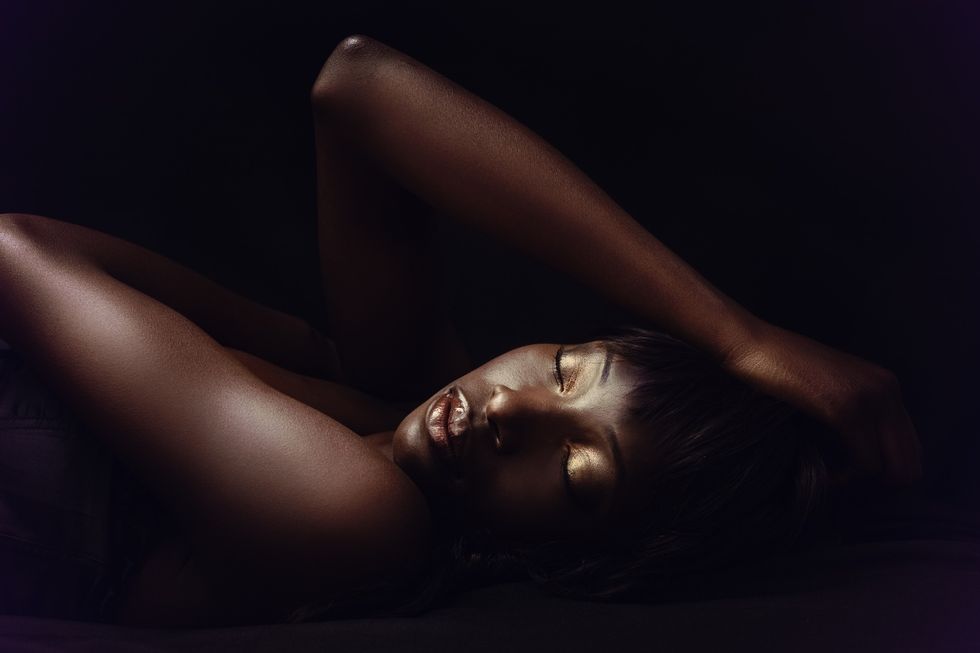
Getty Images
Last one. Your vagina and vulva don’t want to experience friction, especially not 24 hours a day. That’s why it’s important to at least give them both a break during your sleeping hours. That will give them time to get more oxygen, regulate their temperature, prevent excess moisture from creating the perfect breeding ground for a yeast infection, and it will help to keep your hormones balanced, too. At the end of the day, sleeping naked is one of the best ways to be proactive when it comes to avoiding vaginal hyperpigmentation. No doubt about it, sis. So make sure to do it….tonight.
____
Welp. There you have it: 10 all-natural ways to keep your vulva looking as good as (hopefully) it feels. Test some of the remedies out. Let me know how it goes. Especially that rose butter, aight? #wink
Let’s make things inbox official! Sign up for the xoNecole newsletter for daily love, wellness, career, and exclusive content delivered straight to your inbox.
Featured image by TAGSTOCK1/Getty Images
Because We Are Still IT, Girl: It Girl 100 Returns
Last year, when our xoNecole team dropped our inaugural It Girl 100 honoree list, the world felt, ahem, a bit brighter.
It was March 2024, and we still had a Black woman as the Vice President of the United States. DEI rollbacks weren’t being tossed around like confetti. And more than 300,000 Black women were still gainfully employed in the workforce.
Though that was just nineteen months ago, things were different. Perhaps the world then felt more receptive to our light as Black women.
At the time, we launched It Girl 100 to spotlight the huge motion we were making as dope, GenZennial Black women leaving our mark on culture. The girls were on the rise, flourishing, drinking their water, minding their business, leading companies, and learning to do it all softly, in rest. We wanted to celebrate that momentum—because we love that for us.
So, we handpicked one hundred It Girls who embody that palpable It Factor moving through us as young Black women, the kind of motion lighting up the world both IRL and across the internet.
It Girl 100 became xoNecole’s most successful program, with the hashtag organically reaching more than forty million impressions on Instagram in just twenty-four hours. Yes, it caught on like wildfire because we celebrated some of the most brilliant and influential GenZennial women of color setting trends and shaping culture. But more than that, it resonated because the women we celebrated felt seen.
Many were already known in their industries for keeping this generation fly and lit, but rarely received recognition or flowers. It Girl 100 became a safe space to be uplifted, and for us as Black women to bask in what felt like an era of our brilliance, beauty, and boundless influence on full display.
And then, almost overnight, it was as if the rug was pulled from under us as Black women, as the It Girls of the world.
Our much-needed, much-deserved season of ease and soft living quickly metamorphosed into a time of self-preservation and survival. Our motion and economic progression seemed strategically slowed, our light under siege.
The air feels heavier now. The headlines colder. Our Black girl magic is being picked apart and politicized for simply existing.
With that climate shift, as we prepare to launch our second annual It Girl 100 honoree list, our team has had to dig deep on the purpose and intention behind this year’s list. Knowing the spirit of It Girl 100 is about motion, sauce, strides, and progression, how do we celebrate amid uncertainty and collective grief when the juice feels like it is being squeezed out of us?
As we wrestled with that question, we were reminded that this tension isn’t new. Black women have always had to find joy in the midst of struggle, to create light even in the darkest corners. We have carried the weight of scrutiny for generations, expected to be strong, to serve, to smile through the sting. But this moment feels different. It feels deeply personal.
We are living at the intersection of liberation and backlash. We are learning to take off our capes, to say no when we are tired, to embrace softness without apology.
And somehow, the world has found new ways to punish us for it.

In lifestyle, women like Kayla Nicole and Ayesha Curry have been ridiculed for daring to choose themselves. Tracee Ellis Ross was labeled bitter for speaking her truth about love. Meghan Markle, still, cannot breathe without critique.
In politics, Kamala Harris, Letitia James, and Jasmine Crockett are dragged through the mud for standing tall in rooms not built for them.
In sports, Angel Reese, Coco Gauff, and Taylor Townsend have been reminded that even excellence will not shield you from racism or judgment.

In business, visionaries like Diarrha N’Diaye-Mbaye and Melissa Butler are fighting to keep their dreams alive in an economy that too often forgets us first.
Even our icons, Beyoncé, Serena, and SZA, have faced criticism simply for evolving beyond the boxes society tried to keep them in.
From everyday women to cultural phenoms, the pattern is the same. Our light is being tested.

And yet, somehow, through it all, we are still showing up as that girl, and that deserves to be celebrated.
Because while the world debates our worth, we keep raising our value. And that proof is all around us.
This year alone, Naomi Osaka returned from motherhood and mental health challenges to reach the semifinals of the US Open. A’ja Wilson claimed another MVP, reminding us that beauty and dominance can coexist. Brandy and Monica are snatching our edges on tour. Kahlana Barfield Brown sold out her new line in the face of a retailer that had been canceled. And Melissa Butler’s company, The Lip Bar, is projecting a forty percent surge in sales.

We are no longer defining strength by how much pain we can endure. We are defining it by the unbreakable light we continue to radiate.
We are the women walking our daily steps and also continuing to run solid businesses. We are growing in love, taking solo trips, laughing until it hurts, raising babies and ideas, drinking our green juice, and praying our peace back into existence.
We are rediscovering the joy of rest and realizing that softness is not weakness, it is strategy.
And through it all, we continue to lift one another. Emma Grede is creating seats at the table. Valeisha Butterfield has started a fund for jobless Black women. Arian Simone is leading in media with fearless conviction. We are pouring into each other in ways the world rarely sees but always feels.

So yes, we are in the midst of societal warfare. Yes, we are being tested. Yes, we are facing economic strain, political targeting, and public scrutiny. But even war cannot dim a light that is divinely ours.
And we are still shining.
And we are still softening.
And we are still creating.
And we are still It.

That is the quiet magic of Black womanhood, our ability to hold both truth and triumph in the same breath, to say yes, and to life’s contradictions.
It is no coincidence that this year, as SheaMoisture embraces the message “Yes, And,” they stand beside us as partners in celebrating this class of It Girls. Because that phrase, those two simple words, capture the very essence of this moment.
Yes, we are tired. And we are still rising.
Yes, we are questioned. And we are the answer.
Yes, we are bruised. And we are still beautiful.

This year’s It Girl 100 is more than a list. It is a love letter to every Black woman who dares to live out loud in a world that would rather she whisper. This year’s class is living proof of “Yes, And,” women who are finding ways to thrive and to heal, to build and to rest, to lead and to love, all at once.
It is proof that our joy is not naive, our success not accidental. It is the reminder that our light has never needed permission.
So without further ado, we celebrate the It Girl 100 Class of 2025–2026.
We celebrate the millions of us who keep doing it with grace, grit, and glory.
Because despite it all, we still shine.
Because we are still her.
Because we are still IT, girl.
Meet all 100 women shaping culture in the It Girl 100 Class of 2025. View the complete list of honorees here.
Featured image by xoStaff
'You Both Are Going To Change': Tabitha & Chance Brown On Their New Body Collection & Successful Partnership
Tabitha and Chance Brown are the epitome of Black love. They've been married for 22 years after first meeting in middle school and share a beautiful blended family. The beloved couple is no stranger to talking about their journey to the altar and the ups and downs they've faced together on their show, Fridays with Tab & Chance. Now, they have taken the name Fridays and expanded it into a body collection.
The new collection, which dropped on November 14, features a body wash and a body lotion that complement their fragrances, Her Business and His Business. "We had such a huge success with the fragrance launch, and it’s because of our customers and fans," Tabitha shares in an exclusive interview with xoNecole.
"They asked for body products and we wanted to make sure we listened. But also layering fragrance begins with the body routine." The body wash is $33, and the body lotion is $35. Keep reading below to hear more about Tabitha and Chance's new collection, their body rituals, and what makes their partnership successful.
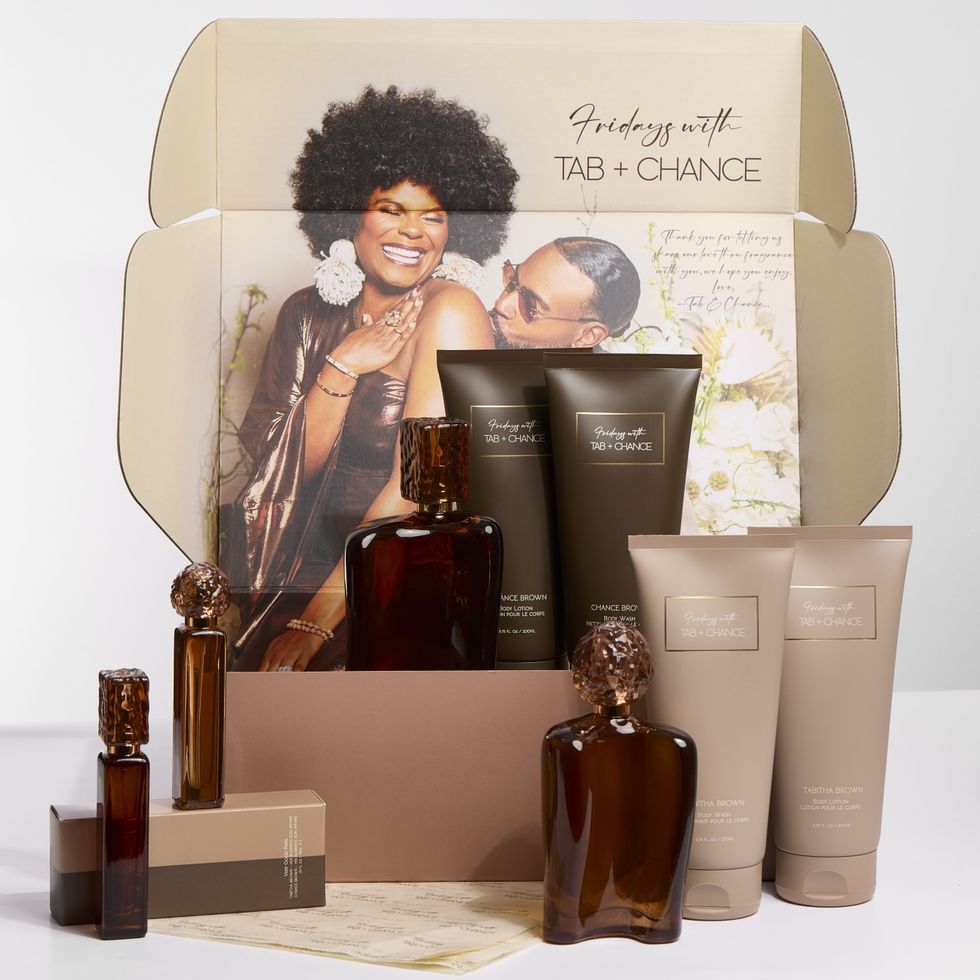
Fridays with Tab and Chance body collection
Marcus Owens
xoNecole: How did you come up with the scents for the collection?
Tabitha Brown: We love warm scents that make you feel sexy and loved. [We’re] both fans of gourmand [scents], including bergamot, vanilla, tonka and chocolate.
xoN: If you could describe your working relationship in one word, what would it be and why?
Tabitha: It's our first time building a product line together and our first time working with fragrance. So having patience with the process and each other has been the best way to build.
xoN: What is your body care ritual?
Tabitha: Exfoliate with a scrub a few times a week, but using a moisturizing body wash daily. After a shower, I spray a body mist that compliments what scent I am choosing for the day. Most times vanilla mist wins because it’s a perfect base for layering. I then hydrate [my] skin with lotion. Then, once dressed, I layer my favorite fragrance, Her Business, first and then His Business on top.
Chance: [I’m] way more simple. Just body wash and lotion and then my cologne and I’m good to go.
xoN: We enjoy watching you two together online, whose idea was it to start 'Fridays with Tab & Chance'?
Tabitha: It actually happened by accident. Back in 2018, my fans had just been asking about how we met, so we did a video answering questions one Friday and people in the comments [asked], will y’all do it again next Friday? And so we did and the next thing you know Fridays with Tab & Chance was born.
xoN: In what other ways do you plan to expand Fridays? Restart the podcast? TV show?
Tabitha: We are working on a lifestyle content show vs the traditional Fridays podcast. More to come soon.
xoN: You do many things together, but what would you say is your favorite quality time activity and why?
Tabitha: We are really simple. We love watching movies or TV series together on the couch or in bed. It’s really one of our favorite things to do together.
xoN: What is your favorite thing about the other person?
Tabitha: I love that he makes me feel safe and how hard he works to be an amazing father.
Chance: I love that she is crazy enough to pursue her wildest dreams.
xoN: What is the key to a successful partnership in business and personal?
Tabitha: The key is knowing that you both are going to change, and giving each other grace, patience, and understanding during those changes.
See more on tabandchance.com.
Feature image Marcus Owens



